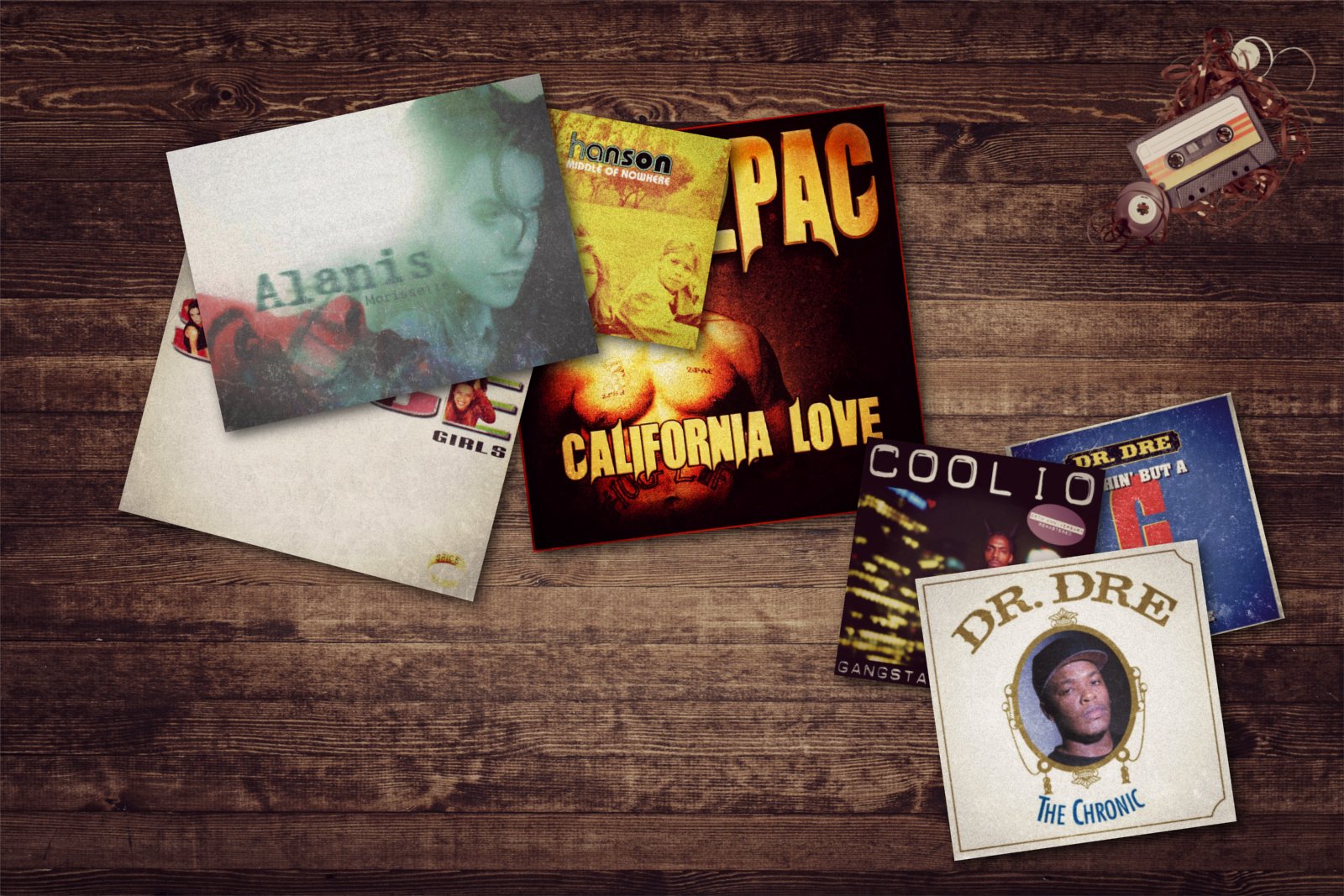
Two 90s Kids Discuss Some More Musical Nuggets
Will Mann and Joel White dissect some music from the 90s. They ultimately decide the Spice Girls aren’t pure evil.
Will Mann: Lately, I have been reflecting on the quintessential rap and hip-hop that feels most emblematic of the decade. Tupac’s “California Love” sticks out as a contender. It has an infectious beat and ties itself firmly to a specific place during a breakout point in music history. Tupac himself exudes such an energy during it, it does feel like the standard-bearer for a type of song that would remain popular for years to come.
Dr. Dre and Snoop Dogg’s “Nuthin’ But a ‘G’ Thang” also stood out, as exemplified by its distinct sound and the fact that it was this crossover between two emerging artists: one recently liberated from a band, and another who would help define the 90s and still remain relevant today. I don’t know if you heard, but both, along with some of their friends, did the Super Bowl halftime show in 2022.
But the timing of this has ended up being very bittersweet because another quintessential song that deserves to be seen as one of the most influential of the decade is Coolio’s “Gangsta’s Paradise,” a staple on the radio in the mid-90s, first used in the Michelle Pfeiffer star vehicle Dangerous Minds and very much a statement of its era.
With lyrics that invoke Psalm 23, as well as unforgettable lines like “too much television watching got me chasin’ dreams,” I would claim that “Gangsta’s Paradise” is an indelible part of the 90s music scene, a song that helps define the moment and set the stage for what is to come.
Allow me a quick moment to reflect on Coolio’s recent passing: no other decade could have given us a figure quite like the acclaimed rapper behind the song. From the theme song to Kenan & Kel to a cameo in Batman & Robin, Coolio was a constant figure in the 90s, and for good reason. One of my first major introductions to the music of “Weird Al” Yankovic was his spoof of the song, “Amish Paradise,” and the story of how Yankovic and Coolio eventually ended up burying the hatchet is an endearing one.
Coolio’s passing, alongside that of figures like DMX and Shock G last spring, represents the end of an era. Many of the rappers of the 1990s left an unmistakable imprint on modern music, and are just getting the appreciation they’re due now upon their deaths. How about we lift up this sad, dour note to end by talking about how the decade of rebellion as embodied by the likes of Nirvana and successful early rap artists eventually became the decade of lighter, dance-heavy, boy bands and girl bands galore toward the end of the decade?
Joel White: You raise a very interesting point by highlighting the almost incongruous music landscape of the late 1990s when compared to just a few years earlier. The music of the early 1990s was the music of struggle and adversity–the visceral depression of Kurt Cobain, the daily struggle for survival in Compton, Coolio walking through the valley of the shadow of death–it was all pretty bleak when you think about it.
And yet, at the close of the decade, we’ve got the Backstreet Boys pumping us up, telling us they’ve “Got It Goin’ On,” and the Spice Girls promising us they’ll give us everything if we just “Say You’ll Be There”. Boy bands and girl groups abounded, tossing aside the existential dread of the early decade for a celebratory, romantic, and most of all passionately carefree dynamic.
At first blush, such a sharp turn might seem a tad jarring, but I think a wider examination of what was going on in the Western world at that time explains quite a bit. The world of the early 1990s was gloomy and uncertain. The Cold War was over, much of the world found itself confronting a tenuous and uncertain future, and the United States–although clearly on the better side of the war–was facing a sharp recession and coming to terms with what George H.W. Bush infamously termed the “New World Order.”
To me, it makes perfect sense that the music of that era would be uniformly gloomy. And where did we find ourselves by the decade’s end? The polar opposite. We were at the top of a massive economic boom, the threat of nuclear war had faded into obscurity, and John Elway finally got that Super Bowl ring. So, yeah, it seems only natural that we’d trade Kurt Cobain’s angst for the dance-happy sex appeal of the Spice Girls.
Mann: Speaking of that famous fivesome of girls, I will neither confirm nor deny reports that 7-year-old me told his pastor that his favorite song was “Wannabe” by the Spice Girls in 1998. Take that as you will, but I genuinely think there’s a case to be made that “Wannabe” is one of the most important songs of the past few decades, but I’ll get to that later. Before we get to that quintessentially 90s pop earworm, might I make an argument for another I consider of equal importance: “MMMBop” by Hanson.
What’s the song actually about? I’ve been trying to figure that one out for the better part of my life, and I still can’t seem to crack it. Is it about growing up? An equal argument could be made that it’s something about a plant or plants plural, maybe? Who cares? “MMMBop” is still catchy all these years later. Hanson themselves were also harbingers of a new, different kind of boy band. Not only would other sibling bands continue to happen (looking at you, Jonas Brothers and HAIM), but the success of “MMMBop” built a foundation upon which the likes of NSYNC and the Backstreet Boys later benefited from and built their entire careers.
And then there’s “Wannabe,” perhaps as big a turning point song for pop as “Smells Like Teen Spirit” was for rock at the beginning of the decade. The Spice Girls were formed by a father-son team trying to break it big by betting on a girl-led pop group, only to discover that the girls themselves proved to be quite punk in their own right, stealing master tapes and personal belongings in the middle of the night to escape from the men that had joined them together. Back then, they were just called Spice, but their bombastic performances during introductory meetings at record labels earned them the supposedly derogatory moniker “those girls from Spice” or “those Spice girls,” which ultimately became the band’s name. They were then managed by people who would later try this again with subsequent British teeny-bop pop band S Club 7, but eventually would rake in millions by creating Pop Idol, the British precursor to American Idol.
And while it might not be on the same tier as, say, “Thriller,” the music video for “Wannabe” feels so of its time. (For example, are those royals featured at the beginning supposed to be now-King Charles, Princes William and Harry, and…Diana!?!) This is because the Spice Girls themselves provide a good energy, less the Beatles or even the Sex Pistols than they were cultural anarchists, coming into the upper echelons of British society and disrupting everything with their snark and sex appeal. Without this breakthrough song at this inflection point in history, the pop scene would be less dominated by women than it is today. Beyonce, Taylor Swift, and Billie Eilish all owe the Spice Girls a massive debt.
It wasn’t the Beatles playing Ed Sullivan, but hey, just like the Fab Four, Ginger, Scary, Sporty, Baby, and Posh starred in their own movie at the height of their popularity. A Hard Day’s Night is an all-time classic; Spice World, less so. I highly recommend this history of the song by YouTuber @TrashTheory that has me convinced “Wannabe” deserves a slot on the National Recording Registry. The bridge that is rapped over by Scary and Ginger in the song is something that is fairly commonplace today but was a somewhat radical move when the song was first released. I think people nowadays can look back at “Wannabe” and appreciate it more despite the unfair backlash and consider fondly how of the moment and quintessentially 1990s it was. Ya know, like Titanic.
White: Gee, Will, I wonder if there’s a song that people tend to associate with Titanic? And I wonder what happened to that film’s brash and innovative director, James Cameron? Is he still bringing blockbuster spectacle to the worldwide masses, creating pop culture phenomena that will last the ages? I apologize; I know that’s a bellyful of painfully obvious rhetorical questions. But it should really speak volumes that you can already hear Celine Dion’s powerful, agile, slightly nasal mezzo belting the lyrics to “My Heart Will Go On” in your head, despite the fact that I didn’t mention that song by name until just now. Written by the late, great James Horner and made famous by Dion, the highest-selling Canadian vocalist of all time, the song that played over the end credits of Titanic (at that time, the highest-grossing film ever) is quite simply the power ballad of the 1990s.
There’s honestly nothing particularly revolutionary about the song in terms of its composition–it utilizes a fairly straightforward chord progression, building on its emotional verses into a climactic chorus. Then we lather, rinse, and repeat, with one killer key change for good measure; the Beatles would be proud. In fact, “My Heart Will Go On” was included in Titanic mostly out of obligation. Blockbusters usually came as a package deal with hit singles at that time, and Cameron wasn’t about to let his latest masterpiece be an exception. Good thing, too, because there’s just something undeniable about the sweeping, epic bliss that particular piece evokes. It really does feel like you’re the king of the world–a feeling many of us were familiar with during the peak of the 1990s.
And while we’re on the topic of sensational female vocalists from Canada (that’s a pretty forced segue, I know), I just want to get in a few quick words about Alanis Morissette. I mention Alanis not only because I consider 1995’s Jagged Little Pill to be among the greatest alternative rock albums ever recorded, but also because I think she’s the perfect encapsulation of the dual 90s trends we’ve identified. Listen to songs like her mega-hit “You Oughta Know” or the lesser-known “Forgiven” and what you’ll hear is nothing less than what would happen if Celine Dion swallowed Kurt Cobain. Jagged Little Pill is grunge meets pop–those same Seattle power chords played underneath lyrics like “And don’t be surprised if I love you for all that you are.” If Nirvana is where we started this journey, and the Spice Girls is where we ended up, then Alanis Morissette represents a wacky and wonderful way station that’s halfway in between, a fusion of musical greatness that I’m not sure we’ll ever discover again.

